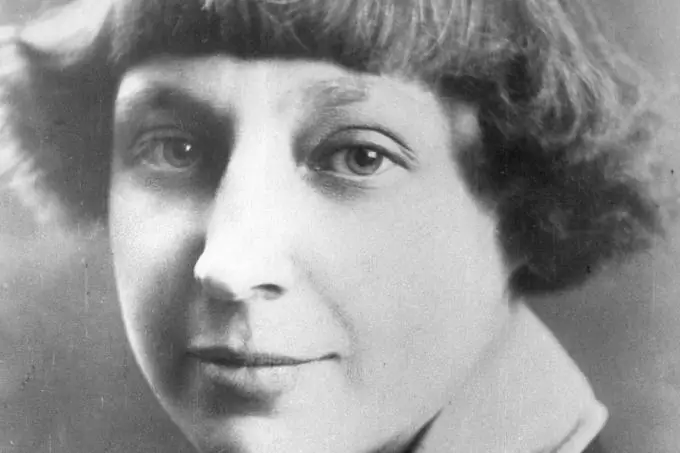- Author Antonio Harrison harrison@cultureoeuvre.com.
- Public 2023-12-16 07:44.
- Last modified 2025-01-22 21:44.
Marina Ivanovna Tsvetaeva is a famous poet of the Silver Age, who is one of the key figures in world poetry of the 20th century. What is interesting about her biography and personal life?

Childhood and adolescence of Marina Tsvetaeva
The future poetess was born in Moscow on September 26, 1892. Her family belonged to high society. Dad was a famous scientist, and mom was a pianist. The upbringing of the daughter fell on the shoulders of the mother. The father often went on business trips and therefore rarely saw the children. Marina and her sister were brought up very strictly. From the age of six, the girl began to write poetry.
Marina's mother always wanted her daughter to become a musician, but her love of poetry overcame this feeling. As a child, Tsvetaeva lived with her mother for a long time abroad, in particular in France, Germany, Italy. Therefore, she could easily express herself and write poetry in several languages. Subsequently, this knowledge will be very useful to her when she will work as a translator.
Her mother died early enough when the girl was 14 years old. In recent years, she was very sick. The father had no time to take care of the children and the girls became independent early. Hence the early fascination with the opposite sex, as well as modern political views.
In 1908, Marina went to study in Paris, where she entered the Sorbonne. Knowledge of languages was useful to her in the difficult Soviet years, when she could not earn money from writing poetry, but only received money for translating texts from one language to another.
Marina Tsvetaeva's creativity
Marina begins her creative activity in 1910, when her first collection of poems, "Evening Album", appears. It mainly contained poems of school years. But at the same time, other famous artists of that time drew attention to her. She made friends with Valery Bryusov, Nikolai Gumilyov and Maximilian Voloshin. She released all her first collections at her own expense.
This was followed by the following collections - "The Magic Lantern", "From Two Books". Further, the poetess annually publishes various collections of poems, but the most famous are "To Akhmatova" and "Poems about Moscow", which were written when she was visiting her sister in Alexandrov.
In 1916, the civil war began, and Tsvetaeva was very worried about the split of society into red and white. This is also reflected in her work. This is how a cycle of poems "Swan Song" about the exploit of a white officer appeared.
After the revolution, Tsvetaeva's husband was forced to emigrate to the Czech Republic. In 1922 Marina also went there. At the same time, foreign readers appreciated the writer's prose much more. She released many memoirs about other great poets Andrei Bely, Maximilian Voloshin and so on. But her poems were practically not read abroad.
In the Czech Republic, she wrote a collection of poems "After Russia", which reflected her feelings about parting with her beloved country and its nature. Then she practically stopped writing. But in 1940 her last collection of poems came out.
Personal life of Marina Tsvetaeva
At the age of 18, Tsvetaeva began to communicate with her future husband Sergei Efron. He was a white officer from a good and distinguished family. Six months later, they got married, and their daughter Ariadne was born. In 1917, the second daughter Irina was born, who died of illness at the age of three. Already, when the family lived in Prague, the son George was born, who died during the Second World War in 1944 at the front.
In addition to her husband, Tsvetaeva very often fell in love with poets and writers of that time. So she had a long affair with Boris Pasternak. And once Marina even fell in love with her friend Sofia Parnok, with whom she began a real love relationship.
The last years of Tsvetaeva's life
In 1939, the family decided to return to Russia from emigration. But that was a mistake. First, her husband, Sergei Efron, was arrested, and then her eldest daughter. Since the beginning of the Second World War, Marina and her son were relocated to Yelabuga. It was there that she could not stand all the tests and hanged herself on August 31, 1941 in a small shed, which was allocated for her to live with George. Some time later, her husband was shot. Since the descendants of Marina Tsvetaeva did not have children, there was no continuation of the family.






